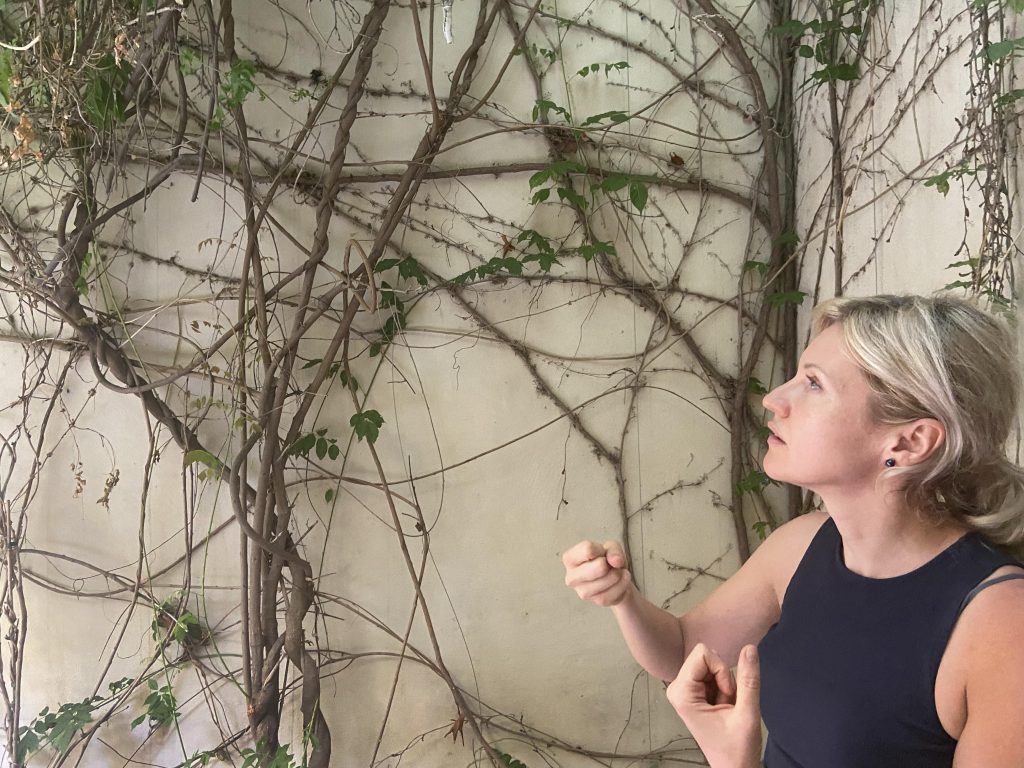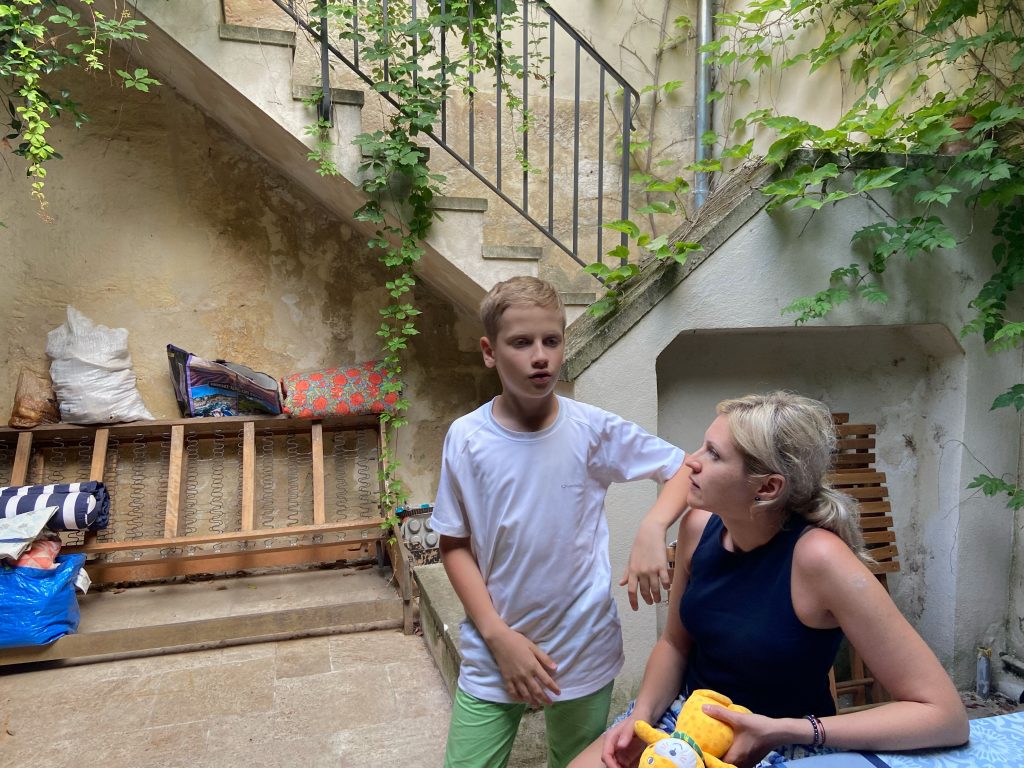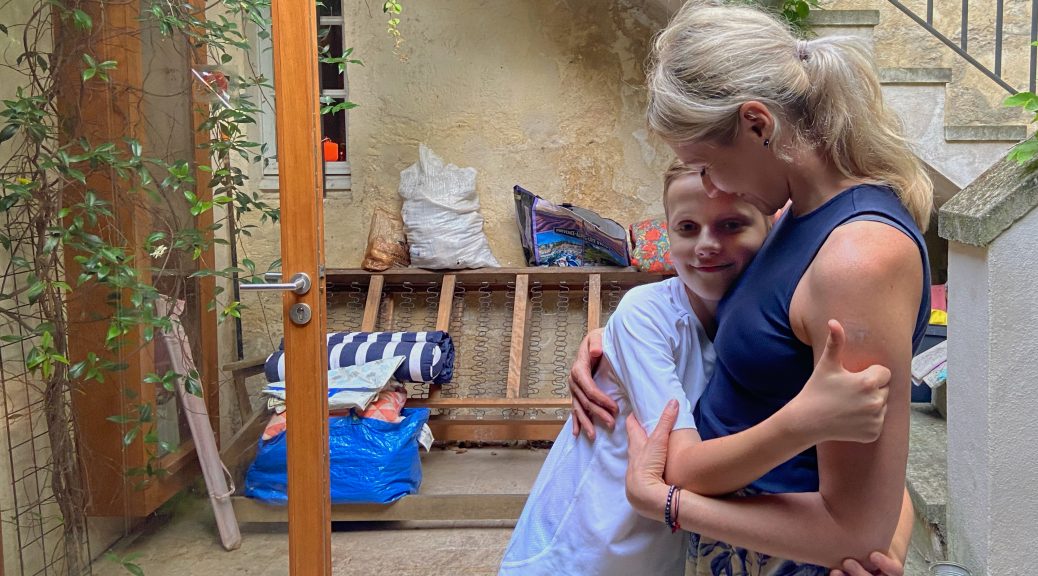Story and photos by Gabriela Calvillo Alvarez
As Iryna K. and her 10-year-old son Alex fled the war in Ukraine, migrating from Germany to Ireland to Arles, he would draw pictures showing how he would find a way to go home.
“First, he denied the war,” said Iryna, 40, who asked that her last name not be published. “He said the war didn’t exist. He told me he wanted to return. Every evening, he would draw me a map of how he would escape. ‘Mom, I will go by this frontier, that frontier,’ and so on.”
The mother and son left Ukraine in May 2022, not long after the war began. They had lived all her life in Kyiv, where the bombardment was intense from the beginning.
Russian leaders, she said, “hoped that in three days Kyiv would be occupied, that they would impose their government, and that then the war would be finished. Anyway, you see that it still continues.”
Iryna is part of a loose network of women and children who are trying to find their footing in Arles. Many of them have families back home in Ukraine and are waiting to return, while others have decided to stay.
“I know that last year, we had many people come in, maybe 150,” said Iryna, whose family remains in Ukraine. “But now, a lot of them have left so it’s hard to have an exact number.”

As of July 2023, nearly 6 million refugees from Ukraine are recorded to be in Europe, according to the UN Refugee Agency. France does not have an official database for this information but a report from the U.S. Department of State Humanitarian Information Unit states that as of Jan. 2023, 119,000 Ukrainian refugees are currently in France.
Arles was one of the cities that provided a haven for Ukrainian refugees. Initially, no official resources were available and it was just a people-helping-people effort. Because she was one of the few who could speak both Ukrainian and French, Iryna served as a bridge for those coming to Arles. While she had secure housing with a local family, she helped connect other women to Arlesians willing to host refugees.
However, one of the challenges these women face when they arrive here is a lack of work opportunities. Since the city is dependent on tourism, especially during the summer months, it’s harder to have a stable income during the off seasons, such as winter and fall.
“Arles doesn’t give you many possibilities to realize your professional potential,” Iryna said. “You can go work at a hotel or a restaurant, but you don’t have a lot of choices.”
Iryna was a unique case. Upon her arrival in Arles, she began an association called Ukraine en Provence to help provide resources to other Ukrainian women who have resettled in the region.
“I did everything because I understood that if I was home alone, with all my thoughts, it would be unsupportable,” Iryna said. “It’s too heavy. It was very difficult to manage my own feelings and in addition, I had to manage [my son’s] feelings, too.”

Last year, she offered a Ukrainian course, in partnership with the Arles à la carte language school, to teach the history and language of the country to locals interested in learning more about the Ukrainian community.
“For French people, it’s very difficult to understand some particularities of Ukraine,” she said.
“So I decided to write a little book that’s like Ukrainian in 30 days.”
Iryna studied languages at a university in Ukraine and speaks English and Italian, as well as French and Ukrainian. These skills helped her communicate and find work.
For most Ukrainian refugees, however, language has been another obstacle. Halyna Mamchur, 35, didn’t know any French when she and her daughter, Maria, arrived in Arles over a year ago. She came here at the suggestion of a French friend she knew from art school in Ukraine.
“It’s been a very difficult and beautiful time for me, this one year,” she said. “I met very happy people and I think I try to be happy, too.”
Four months after she arrived, she decided to pick up drawing once more as a way to process her feelings about leaving her country. Her paintings often contain images of her family and faces combined with bird features, to symbolize freedom and strength.
“For me, it’s a normal artist’s life,” said Mamchur. “It’s my emotions and it’s my experience with people, with my friends, with my parents.”
Mamchur’s friend, Nadja Bailly, 37, studied art in Ukraine for a year with Halyna and they’ve been friends ever since. Bailly has been involved in helping the Ukrainian community since the very beginning of the war. She was one of the few who could translate for those coming into town for safety.
“At the beginning, nobody knew what Ukraine was. Nobody knew its history or the language. But now they do. Everyone knows,” Bailly said.
While some people like Iryna are settling in Arles, others have decided to go back to Ukraine. Mamchur is one of those women. She left last month.
“Maybe when the war is finished, I’ll come back together with my family,” Mamchur said. “Right now, I understand that I only want to live in my country. Maria and I speak Ukrainian, we sing Ukrainian, and I love it.”

